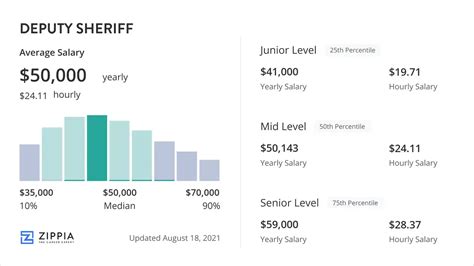A career as a Sheriff's Deputy is more than just a job; it's a commitment to public service, community safety, and justice. For those drawn to this challenging and rewarding path, understanding the financial prospects is a crucial step in career planning. While driven by a sense of duty, deputies can expect a stable career with competitive compensation that grows with experience and specialization.
The national average salary for a Sheriff's Deputy typically falls between $60,000 and $80,000 per year, with the potential to earn significantly more based on factors like location, experience, and specialized skills. This guide will break down what you can expect to earn and how to maximize your income in this vital profession.
What Does a Sheriff's Deputy Do?

Sheriff's Deputies are certified law enforcement officers who work for a county sheriff's department. Unlike municipal police officers who have jurisdiction within a city's limits, a deputy's jurisdiction covers the entire county, including unincorporated areas and towns that do not have their own police force.
Their responsibilities are diverse and dynamic, including:
- Patrolling assigned areas to deter crime and ensure public safety.
- Responding to emergency calls and requests for assistance.
- Conducting traffic stops and investigating accidents.
- Making arrests, issuing citations, and preparing detailed reports.
- Securing crime scenes and collecting evidence.
- Providing security for county courts and transporting prisoners.
- Serving warrants, subpoenas, and other legal documents.
Average Sheriff Deputy Salary

Salary data shows a strong and stable earning potential for this career. According to the U.S. Bureau of Labor Statistics (BLS), the median annual wage for "Police and Sheriff's Patrol Officers" was $71,410 in May 2023.
This median figure represents the midpoint—half of all officers earned more than this amount, and half earned less. A more detailed look reveals a wide salary spectrum:
- The lowest 10% earned less than $48,610.
- The top 10% earned more than $110,030.
Salary aggregators provide a similar picture. Salary.com reports a typical range for a Sheriff/Police Deputy between $64,321 and $76,521, while Glassdoor places the average base pay around $68,500 per year, with total pay often being higher due to overtime and other compensation.
This range highlights that an "average" salary is just a starting point. Your specific earnings will be shaped by several key factors.
Key Factors That Influence Salary

Where you work, how long you've served, and the skills you possess all play a significant role in your total compensation. Understanding these factors is key to charting a successful financial path.
### Level of Education
While most sheriff's departments require a minimum of a high school diploma or GED, followed by rigorous training at a police academy, higher education can be a powerful catalyst for your career. An associate's or, more commonly, a bachelor's degree in criminal justice, criminology, or a related field can:
- Increase Starting Pay: Some larger, more competitive departments offer higher starting salaries or educational stipends to candidates with a degree.
- Open Doors to Promotion: A degree is often a prerequisite or a strong preference for promotions to supervisory ranks like Sergeant, Lieutenant, or Captain.
- Unlock Specialized Roles: Advanced positions in investigations, forensics, or administration frequently require or favor applicants with higher education.
### Years of Experience
Experience is one of the most direct drivers of salary growth in law enforcement. Most departments have a structured pay scale with automatic "step increases" for each year of service.
- Entry-Level (0-3 years): Deputies fresh out of the academy will start at the bottom of the pay scale. This salary is often in the $50,000 to $65,000 range, depending on the department.
- Mid-Career (4-10 years): With several years on the force, deputies become more proficient and valuable. Their base salary increases steadily through step increases, and they gain eligibility for specialized assignments that often come with pay differentials. Earnings can climb well into the $70,000 to $90,000 range.
- Senior/Supervisory (10+ years): Veteran deputies and those in supervisory roles are at the top of the pay scale. Senior deputies often earn longevity pay, and promoted officials like sergeants and lieutenants can see their salaries exceed $100,000, especially in high-paying jurisdictions.
### Geographic Location
Where you work is arguably the most significant factor influencing your salary. Pay varies dramatically by state, county, and whether the area is urban or rural, largely due to differences in cost of living, local government budgets, and union contracts.
According to 2023 BLS data, the top-paying states for police and sheriff's patrol officers are:
1. California: $117,150 (average annual mean wage)
2. Washington: $100,530
3. New Jersey: $98,620
4. Hawaii: $95,290
5. Alaska: $94,860
In contrast, sheriff's departments in states with a lower cost of living, particularly in the Southeast and Midwest, tend to offer lower base salaries. However, a lower salary in a rural county may offer more purchasing power than a higher salary in an expensive metropolitan area.
### Type of Agency
The size and budget of the employing agency are critical. A large, well-funded sheriff's department in a major metropolitan county (e.g., Los Angeles County, CA, or Cook County, IL) will almost always offer higher pay, better benefits, and more opportunities for overtime and specialization than a small department in a rural county with a limited tax base.
Larger agencies handle a higher volume and complexity of calls, requiring more resources and justifying higher compensation to attract and retain qualified deputies.
### Area of Specialization
Once you have a few years of patrol experience, you can pursue specialized assignments. These roles not only make the job more interesting but often come with "assignment pay" or a "pay differential"—a percentage or flat-rate increase to your base salary.
High-paying specializations include:
- K-9 Unit: Handlers receive stipends for the care of their canine partners.
- SWAT (Special Weapons and Tactics): These highly-trained deputies often receive hazard pay and significant overtime.
- Detective/Investigator: A promotion to detective typically comes with a higher pay grade.
- Forensic/Crime Scene Investigation (CSI): Specialized training can lead to higher pay.
- Aviation or Marine Units: Operating specialized vehicles like helicopters or patrol boats requires advanced certification and is compensated accordingly.
Job Outlook

The career outlook for sheriff's deputies remains stable and essential. The BLS projects that employment for police and detectives will grow by 3 percent from 2022 to 2032, which is about as fast as the average for all occupations.
This growth translates to approximately 27,700 job openings each year, on average, over the decade. Most of these openings are expected to result from the need to replace officers who retire or transfer to different occupations. As long as communities need law enforcement to maintain order and respond to emergencies, there will be a steady demand for qualified and dedicated deputies.
Conclusion

Choosing a career as a Sheriff's Deputy is a noble pursuit that offers both personal fulfillment and financial security. While the national median salary provides a solid benchmark, your individual earning potential is in your hands.
By focusing on continuous improvement through education, gaining valuable experience, and pursuing specialized roles, you can significantly increase your income over time. Furthermore, being strategic about your geographic location and the type of agency you work for can place you on an accelerated path to a six-figure salary. For those ready to serve, the career of a Sheriff's Deputy is a path of purpose, promise, and prosperity.
